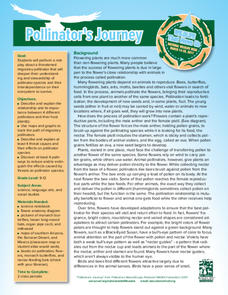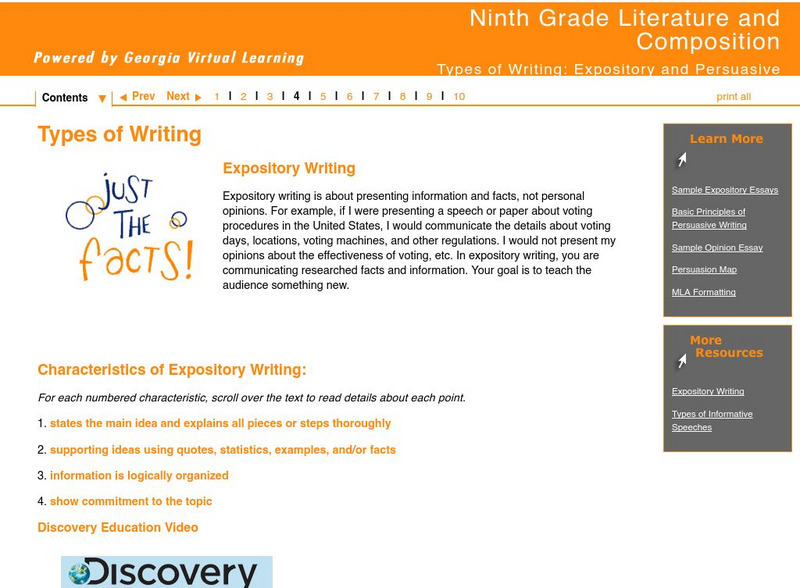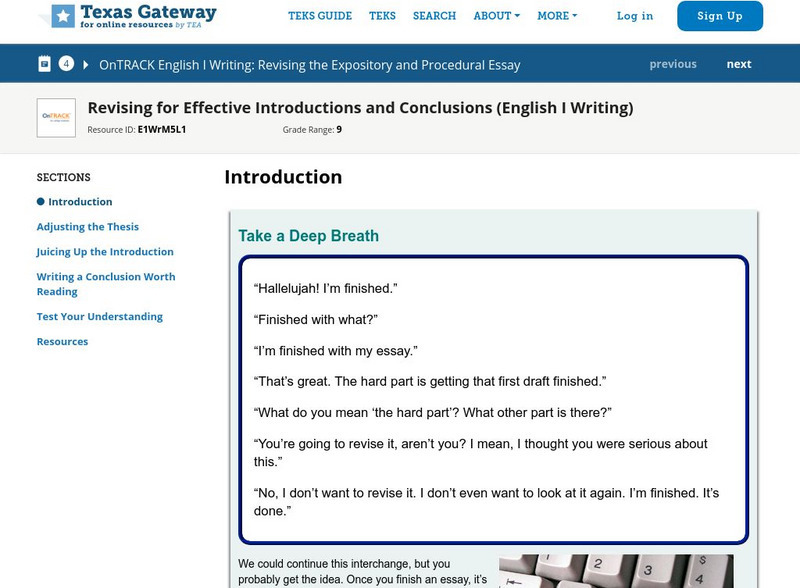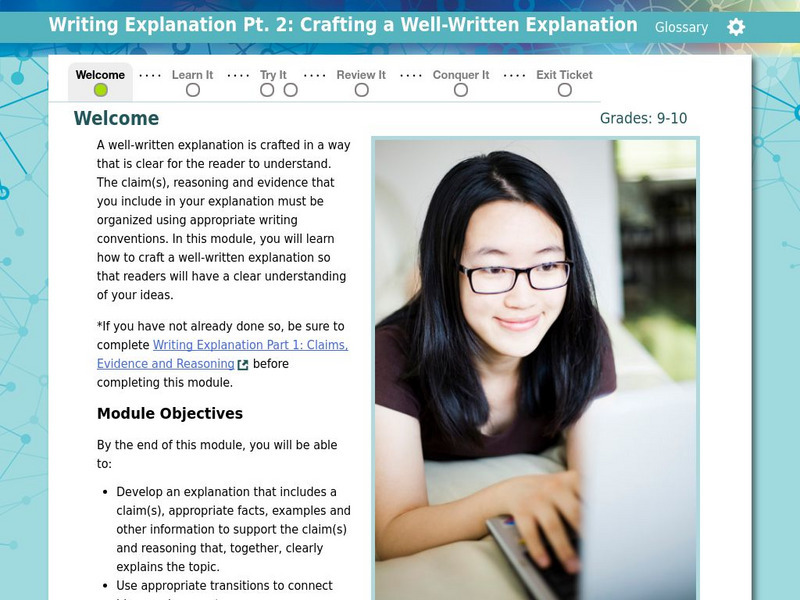National Park Service
Lesson 2: Hope
There's hope in music. Pupils discover what gave enslaved people hope by examining lyrics and music during their time of bondage. A series of prompts helps individuals investigate songs of enslaved people. The cumulative assignment...
National Park Service
Lesson 4: Escape
Some enslaved people decided to run for their liberation. Using lyrics of songs they sang, young historians look at these anthems of freedom. An assessment asks them to write the story of escape from the perspective of an enslaved...
National Park Service
Lesson 3: Resistance
During the time of slavery, resistance was a way of life for the men and women held in bondage. Using music as evidence of their fight against oppression, learners explore how enslaved people fought back. Writing prompts round out the...
National Park Service
Lesson 1: Journaling with Songs of Freedom
There's more to music than a memorable tune. The songs of those who were enslaved reveal the harsh realities of their lives. Using both songs and slave narratives, historians uncover this hidden history. The lesson incorporates a variety...
Children’s Hospital of Philadelphia
Case Study: The 1918 Influenza Pandemic – Factors Beyond the Biological that Influence the Spread of Disease
A very timely lesson looks at the social and political factors that affect the spread of disease. Using the 1918 Influenza Pandemic as a case study, pupils research factors that influenced the spread of the disease, including the role of...
National Wildlife Federation
Pollinator's Journey: Grades 9-12
Gain a deeper understanding of migratory pollinators. After studying about pollinators and their effects on flowering plants, learners hear a story about the migration of Monarch butterflies and bats in the Sonoma Desert. Small groups...
PBS
The Power of Personal Narrative
Personal narratives are powerful things. Whether told from the first-person or third-person point of view, whether in the form of an essay, a short story, novel, or video, whether fiction or fact, they capture readers and give them...
NPR
Chinese American Women Lesson Plan
The National Women's History Museum provides a plan designed to accompany their online CyberExhibit, Chinese American Women; a History of Resilience and Resistance. After examining a series of primary and secondary source documents,...
Maryland Department of Education
The Concept of Diversity in World Literature Lesson 4: Proverbs
"Eneke the bird says since men have learnt to shoot without missing, he has learnt to fly without perching." As part of their study of Things Fall Apart, class members read Paul Hernadi and Francis Steen's essay, "The Tropical Landscapes...
MENSA Education & Research Foundation
The Writer’s Toolbox: What You Need to Master the Craft
Strengthen your high schoolers' writing with a series of steps for writing successfully. With sections on organizing an essay, choosing a topic, crafting a thesis statement, and revising a draft, the lesson plan encourages your class to...
Curated OER
Writing Short Stories: The Fun Way
Do your young authors suffer from writer's block when they try to write short stories? Access their natural creativity with C-Gor, the writing monster! The instructional activity takes aspiring authors through a new writing process...
Curated OER
Lesson Plan 6: Introducing the Elements of Plot-Part Two
November is National Novel Writing Month, so if your young authors are embarking on this journey, be sure they understand plot elements. This collaborative lesson fits into the context of the larger NaNoWriMo project; however, the ideas...
Houghton Mifflin Harcourt
Holt, Rinehart and Winston: Writer's Model: Cause and Effect Essay Example 2
This nine-page essay provides a written example of a cause and effect essay. Clicking on the "Writer's Guide" link in the upper right-hand corner of the page enables the user to get tips, directions, and explanations on the essay.
Houghton Mifflin Harcourt
Holt, Rinehart and Winston: Writer's Model: Progress Report Example
This five-page essay provides an example of a Progress Report. Clicking on the "Writer's Guide" link in the upper right-hand corner of the page enables the user to get tips, directions, and explanations on the essay.
SUNY Empire State College
Empire State College: Shaping Information: Ordering Information and Outlining
Discusses finding a logical order for the ideas you wish to present in your essay. Uses samples to show how changing the position of the topic sentence changes the emphasis. Briefly touches on transitions. Then discusses the outline as...
University of Glasgow
University of Glasgow: Critical Reviews
This site is designed to be used by psychology students at the university level, but it provides helpful instruction for anyone writing critical reviews of non-fiction. Instruction includes everything from how to be critical to...
Other
Sample Paragraph Unity
This lesson plan could conceivably be done by students independently, especially if the teacher downloaded it into student files. The process the author explains seems so simple, yet so practical.
Georgia Department of Education
Ga Virtual Learning: Types of Writing: Expository Writing
This lesson focuses on expository writing including definition and characteristics. It provides links to the Discovery Education video: "An Unsinkable Essay," "Expository Essays," "What is Expository Writing?" "Types of Informative...
Sophia Learning
Sophia: Conclusions
This lesson focuses on writing conclusions; it lists and defines the parts of a conclusion: thesis recap, blueprint recap, and clincher and provides a sample of an effective conclusion with the parts labeled. It also offers a slideshow...
Sophia Learning
Sophia: Analytical Papers: Organization
This slideshow tutorial focuses on organizing an analytical paper; it defines analysis and outlines the basic five- paragraph essay format. It discusses what goes into the introduction, the body paragraphs, and the conclusion. It...
Texas Education Agency
Texas Gateway: Revising for Effective Introductions and Conclusions
[Accessible by TX Educators. Free Registration/Login Required] Learn strategies for evaluating and revising an introduction, conclusion, and controlling idea or thesis in an essay.
British Council
British Council: Essays: Structure 2
This website provides tips to writing which develops an argument. When writing an essay, show that the writer can construct a coherent argument and employ critical thinking skills, as well as support an argument with evidence.
Thinkport Education
Thinkport: Writing Explanation Pt. 2: Crafting a Well Written Explanation
In this module, students will write an explanation about climate change based on the claims, evidence and reasoning they identified in the Writing Explanation Part 1: Claims, Evidence and Reasoning.
Thinkport Education
Thinkport: Writing Explanation Part 1: Claims, Evidence and Reasoning
In this module, students will explore how claims, evidence and reasoning are used to write an effective explanation. Students will read an article that addresses the question, "Should Congress consider comprehensive climate change laws?"
























